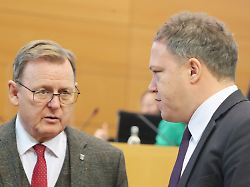Federal politicians are strictly against it
Eastern CDU state leaders open to talks with Wagenknecht
October 27, 2023, 9:07 p.m
Listen to article
This audio version was artificially generated. More info | Send feedback
Sahra Wagenknecht’s party has not yet been founded, but it is already making offers of cooperation to the CDU at the state level. In Brandenburg and Thuringia, the state leaders are open to this. The CDU federal leadership is foaming at the mouth.
In view of the state elections scheduled for 2024, a debate has broken out in the CDU about how to deal with Sahra Wagenknecht’s future party. Wagenknecht’s offer to form government alliances in East Germany was rejected by the CDU federal leadership. On the other hand, the CDU state chairmen of Brandenburg, Jan Redmann, and Thuringia, Mario Voigt, do not want to reject this from the outset. As Wagenknecht announced in the meantime, the term “left” should not appear in the name of her party.
CDU party vice-president Andreas Jung told the newspaper “Welt” that what is currently known about the program of the party project is “light years away from our convictions on key issues.” He cited “anti-Americanism, pro-Putin and socialism” as examples. However, the CDU will not make “any premature decisions,” Jung continued.
Union parliamentary secretary Thorsten Frei told the newspaper: “We have nothing in common with the Wagenknecht party, but the question doesn’t even arise at the moment.” He added: “Before we make an incompatibility decision, the party should first be founded and make it into parliament.”
Klöckner sees clear incompatibility
CDU treasurer Julia Klöckner told the “Welt”: “The Union has a clear incompatibility decision with regard to the AfD and the Left. This of course also applies to the Wagenknecht party, which merges the positions of the AfD and the Left like a horseshoe.”
On the other hand, the CDU state chairmen of Brandenburg and Thuringia do not want to reject possible alliances from the outset. “The ability to talk among Democrats is important,” Voigt told the “Bild” newspaper. However, he added: “Ms. Wagenknecht has not yet attracted attention for making politics for the bourgeois middle.” Redmann told “Bild” that it was clear that there were “extreme differences” between the CDU and the planned new party. The Brandenburg CDU state leader advocated “now we wait for the next developments”.
The former CDU chairman of Thuringia, Mike Mohring, warned his party not to rule out cooperation. “Months ago, the then imaginary Wagenknecht party came straight into first place in a survey for Thuringia,” Mohring told the Berlin “Tagesspiegel”. “Above all, this shows that people are looking for something new beyond all the parties represented in the state parliament, from left to right.”
Wagenknecht recently expressed interest in a possible coalition with the local CDU with a view to the state elections in Saxony, which, like Thuringia and Brandenburg, will vote in 2024.
Gauck: Wagenknecht alliance must be fought
Former Federal President Joachim Gauck called for the new alliance to be fought as well as the AfD. This is necessary “to defend our open and liberal society,” Gauck told the Bayern media group. The planned Wagenknecht party combines “selected leftists with national-populist arguments” and will primarily lure away voters from the Social Democrats and the AfD.
The CDU chairman Friedrich Merz told the “Stuttgarter Zeitung” and the “Stuttgarter Nachrichten” that Wagenknecht might succeed in “taking away a lot of votes from the right-wing extremist AfD.” At the same time, he emphasized: “I find the fact that we will soon have two populist parties very worrying.”
Wagenknecht told “Focus” with regard to the name of the new party: “In the future, it must be a name that appeals to our broad spectrum of potential voters.” She added: “Labels like ‘left’ will not appear in it because many people today associate them with completely different content.”
Wagenknecht announced last Monday that he would found a new party in January. Together with nine other MPs, she has already announced that she is leaving the Left Party. However, the breakaways do not want to give back their Bundestag mandates, and they also want to continue to belong to the Left faction for the time being.
